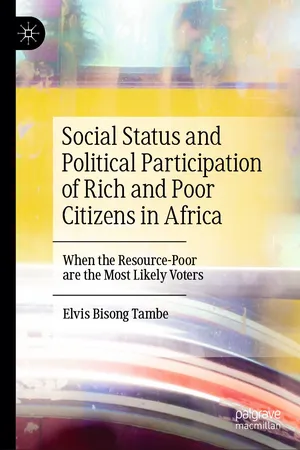
Social Status and Political Participation of Rich and Poor Citizens in Africa
When the Resource-Poor are the Most Likely Voters
- English
- ePUB (mobile friendly)
- Available on iOS & Android
Social Status and Political Participation of Rich and Poor Citizens in Africa
When the Resource-Poor are the Most Likely Voters
About this book
This book seeks to explore a fundamental obscurity in electoral behavior literature: while socioeconomic status is typically robustly and positively associated with a higher propensity for voting worldwide, the relationship in Africa is either negative or non-existent. Building upon the author's previous works relating to political participation, behavior and electoral processes, this work focuses specifically on 35 sub-Saharan African political system case studies and analyzes why resource-poor Africans tend to display greater electoral participation than their more comparatively affluent counterparts. Drawing from a methodological–theoretical framework utilizing Afrobarometer data and group mobilization theories such as the civic voluntarism model, electoral clientelism, democratic quality, preference theory and institutional perspectives, this book makes an original contribution to analyzing African regions less well-examined in existing comparative participatory political science literatures.
Frequently asked questions
- Essential is ideal for learners and professionals who enjoy exploring a wide range of subjects. Access the Essential Library with 800,000+ trusted titles and best-sellers across business, personal growth, and the humanities. Includes unlimited reading time and Standard Read Aloud voice.
- Complete: Perfect for advanced learners and researchers needing full, unrestricted access. Unlock 1.4M+ books across hundreds of subjects, including academic and specialized titles. The Complete Plan also includes advanced features like Premium Read Aloud and Research Assistant.
Please note we cannot support devices running on iOS 13 and Android 7 or earlier. Learn more about using the app.
Information
Table of contents
- Cover
- Front Matter
- 1. The Puzzle
- 2. Socioeconomic Status and Voting in Africa: A Closer Look
- 3. Group Membership and the Mobilisation of Resource-Poor Voters
- 4. Reward Mobilisation and the Participation of Resource-Poor Citizens
- 5. Regime Type, Democratic Quality and the Participation of Resource-Rich Citizens
- 6. Policy Preferences and the Participation of Resource-Rich Citizens
- 7. Institutional Context
- 8. Conclusion
- Back Matter